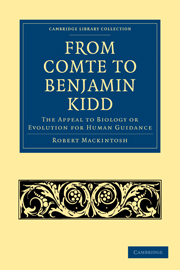Book contents
- Frontmatter
- PREFACE
- Contents
- CHAPTER I INTRODUCTORY
- PART I COMTISM, WITH SOME SCATTERED PARALLELS
- PART II SIMPLE EVOLUTIONISM—SPENCER, STEPHEN
- CHAPTER VII DARWINIAN AND SPENCERIAN CONCEPTIONS OF EVOLUTION—DARWIN
- CHAPTER VIII DARWINIAN AND SPENCERIAN CONCEPTIONS OF EVOLUTION—SPENCER
- CHAPTER IX MR. SPENCER'S THREE DOCTRINES OF HUMAN WELFARE
- CHAPTER X MR. LESLIE STEPHEN'S “SCIENCE OF ETHICS”
- PART III DARWINISM, OR STRUGGLE FOR EXISTENCE
- PART IV HYPER-DARWINISM—WEISMANN, KIDD
- Index
CHAPTER VII - DARWINIAN AND SPENCERIAN CONCEPTIONS OF EVOLUTION—DARWIN
Published online by Cambridge University Press: 29 August 2010
- Frontmatter
- PREFACE
- Contents
- CHAPTER I INTRODUCTORY
- PART I COMTISM, WITH SOME SCATTERED PARALLELS
- PART II SIMPLE EVOLUTIONISM—SPENCER, STEPHEN
- CHAPTER VII DARWINIAN AND SPENCERIAN CONCEPTIONS OF EVOLUTION—DARWIN
- CHAPTER VIII DARWINIAN AND SPENCERIAN CONCEPTIONS OF EVOLUTION—SPENCER
- CHAPTER IX MR. SPENCER'S THREE DOCTRINES OF HUMAN WELFARE
- CHAPTER X MR. LESLIE STEPHEN'S “SCIENCE OF ETHICS”
- PART III DARWINISM, OR STRUGGLE FOR EXISTENCE
- PART IV HYPER-DARWINISM—WEISMANN, KIDD
- Index
Summary
The appeal to biology, so far as it was formulated by Comte in the interests of social science, did not seem to possess any great significance. The immense rise in importance that was to accrue to biology from the evolutionary theories of this age was hidden even from the best minds of the preceding age. Even Hegel speaks scornfully of the foolishness of trying to read the purely ideal evolution, described in his system, as a process in time; but those who feel his influence most strongly to-day have generally accepted the identification. Comte goes further still. He expressly names hypotheses regarding the origin of species among the wasteful and unprofitable inquiries which the human providence will discourage and put down. So unfit are even the learned to play the part of providence. So liable are they to misjudge doctrines which, even if destined at last to be regarded as onesided and more or less fallacious, have yet shown themselves immensely fruitful in suggestions bearing upon every branch of human knowledge. It is now admitted by able adherents of Comte's system that the doctrine of evolution supplies a background or basis for Comte's unification of knowledge. In such a statement Spencer's form of evolutionary doctrine seems to be most directly contemplated, and Spencer is perhaps the least thoroughly biological of all the evolutionary thinkers, whether moralists or sociologists, whom we shall have to pass in review.
- Type
- Chapter
- Information
- From Comte to Benjamin KiddThe Appeal to Biology or Evolution for Human Guidance, pp. 60 - 70Publisher: Cambridge University PressPrint publication year: 2009First published in: 1899



